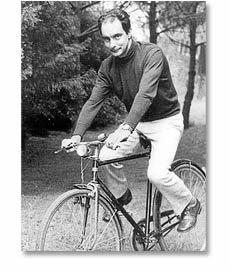|
Italo Calvino
 Italo Calvino has the same effect on me as Richard Serra. If I had been a writer I would have liked to write novels like Calvino. In the past ten years I have to some extent lost my appetite for certain forms of literature because of its largely narrative nature. Of course I realize that hordes of readers hang upon every word of writers like Gabriel Garcia Marquez because he ‘tells such lovely stories.’ That is fine, but it is not my cup of tea. Italo Calvino has the same effect on me as Richard Serra. If I had been a writer I would have liked to write novels like Calvino. In the past ten years I have to some extent lost my appetite for certain forms of literature because of its largely narrative nature. Of course I realize that hordes of readers hang upon every word of writers like Gabriel Garcia Marquez because he ‘tells such lovely stories.’ That is fine, but it is not my cup of tea.
Neither am I at all interested in the autobiographical baggage in (particularly Dutch) literature. Usually, the second question a writer is asked, in whatever literature TV show, is: “Is it autobiographical?” I don't give a damn, for it has no bearing on the quality of a book at all. It’s totally irrelevant.
I am all the more interested in books about books, or about writing — what is sometimes referred to as the ‘meta-novel’. If on a winter’s night a traveller by Calvino starts with the purchase of a book. You go to a shop and buy this book in order to read it at home. The first chapter stops abruptly: it turns out the quires in the book have been bound wrongly. So you have to go back to the shop for a new copy. Then you find that instead of the newest book by Calvino you want to read the book that has been incorrectly bound. And so on.
Ingeniously, some of the chapters in the book are numbered whereas others have titles. In the beginning, as a reader, you are especially keen on the chapters with titles as they contain the story. But because that constantly changes, at a certain moment the numbered chapters begin to pique your interest. A shift takes place as you read the book. If on a winter’s night a traveller is really about writing and reading. That is the real subject.
Is my music about music? Music is always about music! Unless you incorporate text, then you refer to matters outside music. Of course, the titles of my works and the quotes that I use relate to extramusical topics. But such quotes are merely intrinsic winks. My works should not be mistaken for collages. I always create a framework. For instance, walking on Broadway in ’cross Broadway you sometimes come across things that you know. But in a different context.
Using a magic square for this booklet is also Calvinoesque. It is reminiscent of the chapter ‘In a network of lines that intersect’ from If on a winter’s night a traveller. I have arranged a number of elements: thinking about art, making art, the being of art, experiencing art. That is usually the order, then you link up the content. What connects me to Calvino is our approach to construction. He also moves along the same lines — from abstract to programmatic — as I do when creating music.
My favourite chapter in Mr Palomar is ‘The model of models’. A philosopher may propose a model, which relates to real life. Except that later the model often turns out to be inadequate. As Calvino says: “[...] if the model does not succeed in transforming reality, reality must succeed in transforming the model.”
But I think what is really relevant to Calvino is the aspect of lightness. Although his work is methodical, Calvino manages to write with a very light touch. No, I don’t mean without pretensions. I mean ‘light’ as in leggiero. He is able to formulate complex issues in such a way that they are easy to digest, instead of being dry and dull. They even appear to be simple. As to composing, I always say it is exceedingly easy to write a convoluted piece, but virtually impossible to create something that is uncomplicated. And that is what a composer should aim for: simplicity.
|